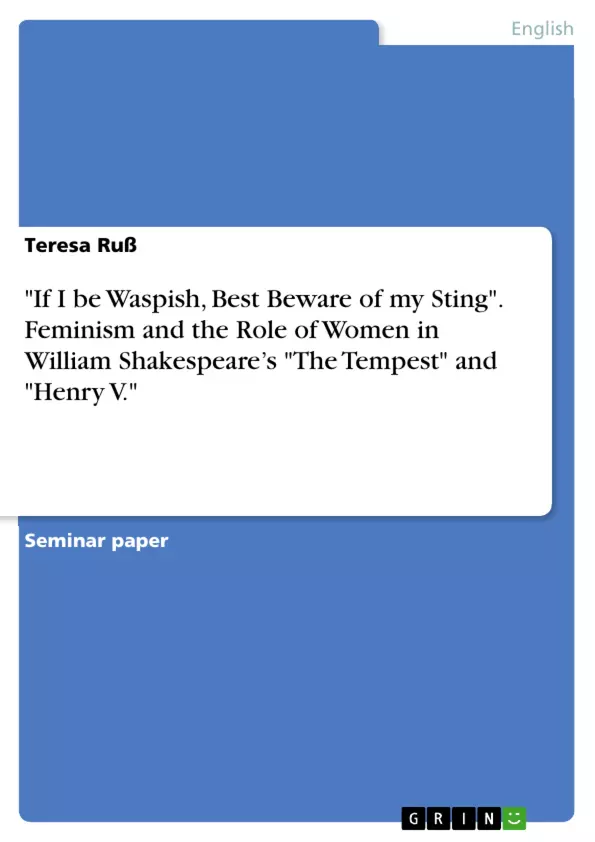The following paper aims to answer the following question in mind: Is William Shakespeare a feminist author?
With feminism and especially feminist writers on the rise and a newly found interest in gender studies within younger generations the question of gender critical studies of classic literary works arises. It has to be said that particularly Shakespeare’s works has been a centre point of those studies for quite a time now, specifically in a context in which women are doing close readings of his work. If the book "Women reading Shakespeare" is to be believed, women critically read his works starting in his own lifetime, up until now. But of course, the perception of his work changed over the centuries with the changing of the female role in society. A rather new definition of feminism is the one from the Merriam-Webster dictionary, which states that feminism is “the theory of the political, economic and social equality of the sexes”.
The first chapter of this thesis intends to be a short overview about the historical frame of the plays and the role of women in general. "The Tempest" is going to be the topic of the next chapter, with an analysis of Miranda, her speeches and how she is treated on the male-dominated island. Additionally, the absence of the (supposed) witch and mother of Caliban, Sycorax, is to be discussed alongside of Shakespeare’s ideals in this play. Following the analysis of "The Tempes"t is the one of "Henry V." with a breakdown of Katherine’s character and how she interacts with the men in the play including another look at Shakespeare’s own worldview in this play. Lastly, with the help of the preceding research, follows a conclusion that aims to answer the question posed in this introduction.
Inhaltsverzeichnis (Table of Contents)
- Introduction
- Historical Background of the play - the role of women in the Elizabethan Era
- The problem of the subjected female characters in The Tempest
- Sycorax
- The paradox of Miranda
- Shakespeare's ideology in The Tempest
- Henry V. and feminism
- The role of Katherine de Valois in Henry V
- Shakespeare's worldview in Henry V. in context
- Conclusion
Zielsetzung und Themenschwerpunkte (Objectives and Key Themes)
This paper aims to explore the portrayal of women in William Shakespeare's plays, The Tempest and Henry V., within the context of the Elizabethan Era and emerging feminist thought. It investigates whether Shakespeare's works can be considered feminist, given the historical limitations of the time. The paper also examines the roles and representations of female characters, including Miranda, Sycorax, and Katherine de Valois, analyzing their agency and treatment within the plays.
- The role of women in Elizabethan society
- The representation of female characters in Shakespeare's plays
- The concept of feminism in Shakespeare's time
- The portrayal of female agency and power in The Tempest and Henry V.
- Shakespeare's worldview and its reflection in his plays
Zusammenfassung der Kapitel (Chapter Summaries)
- Introduction: This chapter provides a general overview of the paper's objectives, outlining the historical context of the study and introducing the key questions that will be addressed. It also discusses the contemporary relevance of feminist readings of Shakespeare's plays.
- Historical Background of the play - the role of women in the Elizabethan Era: This chapter provides a detailed overview of the social and cultural context of Elizabethan England, focusing on the role of women within the patriarchal society. It explores societal expectations and limitations placed on women and the influence of these restrictions on artistic expression, particularly in theatre.
- The problem of the subjected female characters in The Tempest: This chapter examines the female characters in The Tempest, focusing on Miranda and Sycorax. It explores their representation in the play, their limited agency, and the potential for feminist interpretation. The chapter also discusses how the play might be viewed through a feminist lens, considering the absence of female voices and perspectives.
- Henry V. and feminism: This chapter shifts the focus to Henry V. and analyzes the role of Katherine de Valois within the play. It explores her agency, her interaction with the male characters, and the potential for feminist interpretations of her character. The chapter also examines the broader implications of the play's portrayal of women and power.
Schlüsselwörter (Keywords)
This paper explores key themes such as feminist readings, Shakespearean plays, Elizabethan Era, female characters, agency, power dynamics, and the historical context of gender roles. It delves into the portrayal of women in The Tempest and Henry V., analyzing the characters of Miranda, Sycorax, and Katherine de Valois. The research further examines Shakespeare's worldview and its reflection in his work, considering the limitations of his time and the evolution of feminist thought.
Frequently Asked Questions
Can William Shakespeare be considered a feminist author?
The paper investigates this by analyzing female characters like Miranda and Katherine, considering the historical limitations of the Elizabethan Era.
What is the role of Miranda in "The Tempest"?
Miranda is analyzed in the context of her speeches and how she is treated on an island dominated by male figures like Prospero and Caliban.
Who is Sycorax and why is her absence significant?
Sycorax is the mother of Caliban and a powerful witch. Her absence is discussed as part of Shakespeare's ideological framework regarding female power.
How does Katherine interact with men in "Henry V"?
The analysis focuses on Katherine de Valois' agency and how she navigates her role in a political landscape controlled by men.
What was the status of women in the Elizabethan Era?
The paper provides a historical overview of the patriarchal society of the time, which heavily restricted women's roles and rights.
- Arbeit zitieren
- Teresa Ruß (Autor:in), 2018, "If I be Waspish, Best Beware of my Sting". Feminism and the Role of Women in William Shakespeare’s "The Tempest" and "Henry V.", München, GRIN Verlag, https://www.grin.com/document/513227



